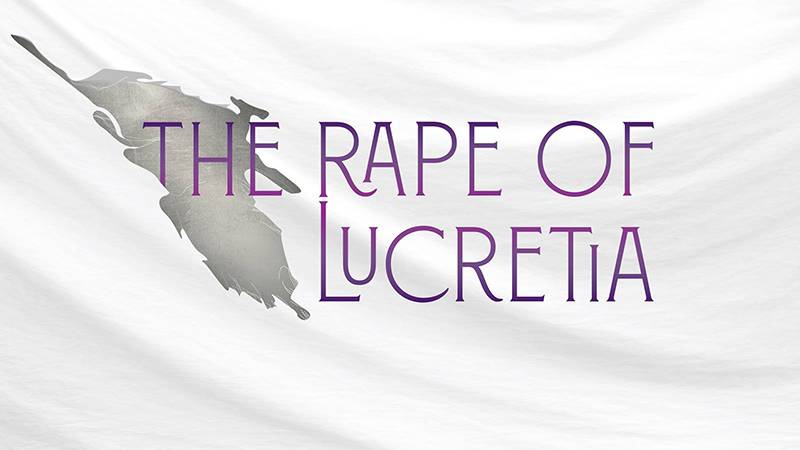Take a 2,500-year-old story of war, morality, and how women’s bodies get caught in between, add a current cultural-political context of the War-on-Christmas meets the War-on-Women’s Bodies, stir with a modern classical score, mix vigorously with the passion, bravery, and brilliance of a female-led creative team, and behold the powerful alchemy of The Lyric Theatre of Illinois’ production of The Rape of Lucretia.
A collaboration between Lyric Theatre co-director Julie Gunn (conductor and pianist) and Kirsten Pullen, head of the Illinois Department of Theatre (director), The Rape of Lucretia brings an innovative retelling of a sadly still-relevant story powered by Benjamin Britten’s 20th century score.
I had the pleasure of chatting with conductor Julie Gunn about the production process, the score, and what she most wants audiences to know.
Smile Politely: The Rape of Lucretia is being produced as part of the month-long Sonic Illinois series, which highlights new music, interdisciplinary collaboration, and innovation. What about the work itself, or a 2019 production of it, made it seem like a good fit for the series?
Julie Gunn: I think Benjamin Britten is still viewed as a new composer, because the 20th century was so disruptive in the way music was written. We haven’t quite digested it all! and because the orchestra much more resembles a group of the current age.
SP: You’ve said that this is a challenging score and a challenging story. How did you and director Kirsten Pullen navigate the process?
Gunn: We were guided by the wonderful libretto and score, which interpret much of the story for us. Although The Rape of Lucretia is a story that has been told for centuries about the founding of Rome, and about the abuses of hereditary monarchy, Britten and his literary collaborators, Obey and Duncan, tell the story in a much more personal and spiritual way. And Kirsten did a great job delineating the characters, allowing each of them to speak for themselves., and by that giving diverse perspectives to the story.
SP: Lucretia’s story is approximately 2,500 year old, yet, feels more relevant than ever, given our current cultural and political climate. How did this sense of being tied to both the past and the present impact your approach?
Gunn: The libretto talks from the very beginning of interpreting an old story.The designers have done a wonderful job in setting Lucretia’s experience in a classic and timeless setting, with Roman, but also other traditional influences, making us feel like this story could have happened anywhere. The narrators, who are set much more specifically in the 1920’s, say, ”While we as two observers stand between this present audience and that scene,” bringing their own life experiences to it. I hope the audience will be encouraged to bring their own life experiences to it as well.
SP: This production of The Rape of Lucretia was lead by an entirely female creative team. What was this like? How did it impact the telling of the story? The production process?
Gunn: In my opinion, the Rape of Lucretia is a story about sin, and evil’s desire to snuff out goodness. Lucretia is the embodiment of goodness in this story, and is attacked by evil in an act of sexual violence, which destroys her and everyone whom she loves, and yet is part of goodness’ ultimate victory. I think having an all-female team, which has been in every way a hugely affirming experience for me, puts women’s experiences at the center of the human condition. What happened to Lucretia is at the heart of our collective and personal experience.
SP: Britten’s score for The Rape of Lucretia was written in the 1940’s, which is relatively modern, as operas go. How would you characterize the score? Will new-to-opera audiences find it more accessible than classical opera?
Gunn: The score is extremely evocative of the drama and psychological states of the characters. Britten is absolutely at the service of the drama, and uses a wide range of compositional techniques to tell the story. To name a few styles, there is modal writing, polytonality, recitative, baroque passacaglia, plainchant, leitmotifs and, actually a little old-style rap. New-to-opera people don’t need to worry about any of that. The story is crystal clear and heightened by the music. I think this opera, and all Britten operas, will appeal to people who like theater, philosophy, history, and psychology.
SP: Is there anything else you’d like potential audience members to know about the production?
Gunn: Britten and Obey are writing in a tradition that associates suffering with the Christ figure. The narrators in their own ways express this view. Although we are presenting this opera in a spirit that is timeless and multi-cultural, we feel that this is the right time to bring this voice to the mix of contemporary thought. The idea that an innocent woman’s suffering changes the world is harrowing and beautiful, and we’re hoping to share that idea with the community.
Sonic Illinois: The Rape of Lucretia
Krannert Center for the Performing Arts
Tryon Festival Theatre
500 S Goodwin Ave, Urbana
February 21st to 23rd, 7:30 p.m.
February 24th, 3 p.m.
Order tickets or get more information here
Attend Dessert and Conversation for an additional $10 and enjoy a discussion with the creative team prior to the February 23rd and 24th performances.
Music by Benjamin Britten,
Libretto by Ronald Duncan
Julie Jordan Gunn, conductor
Kirsten Pullen, director
Photo from KCPA Facebook page








